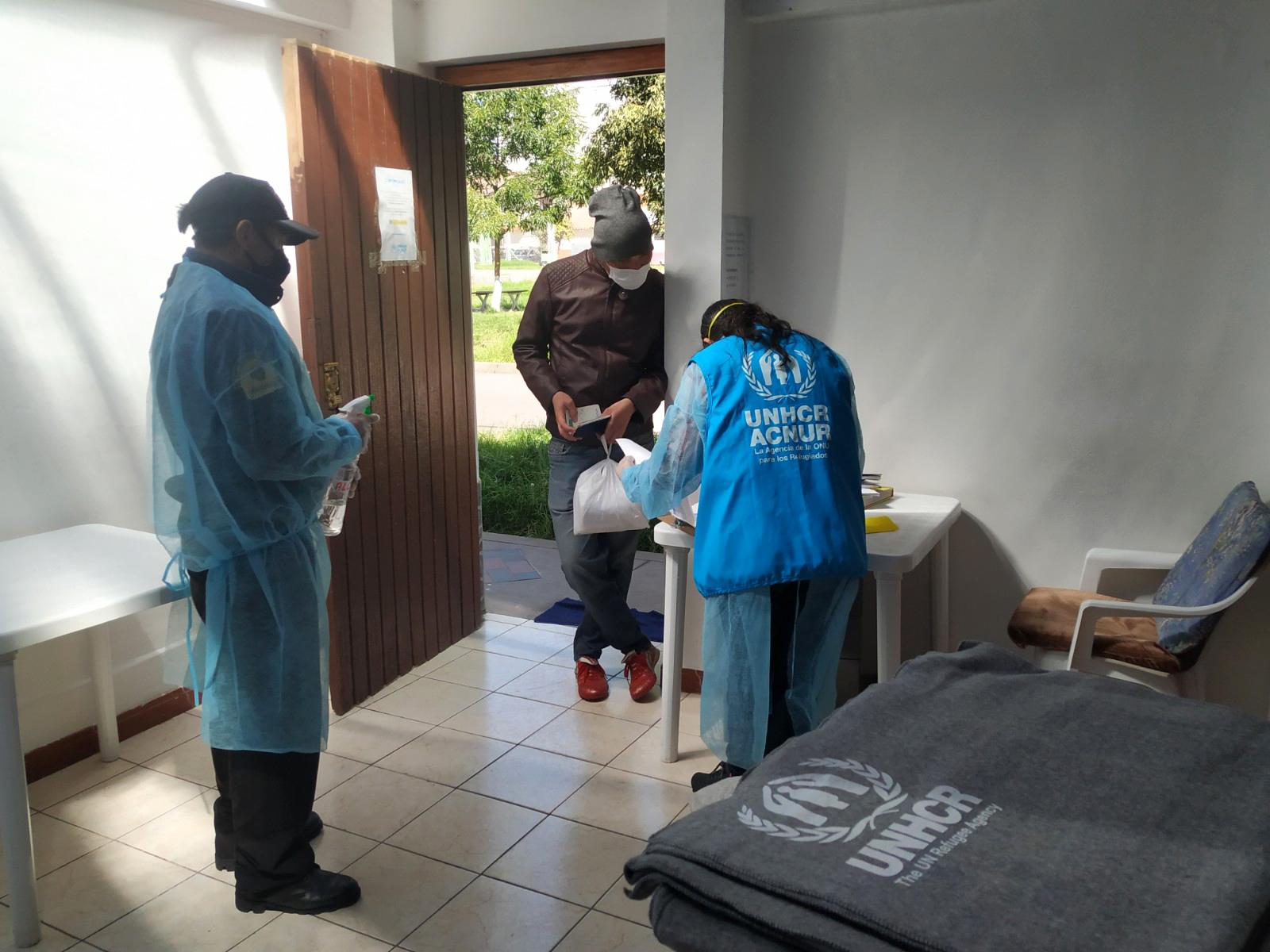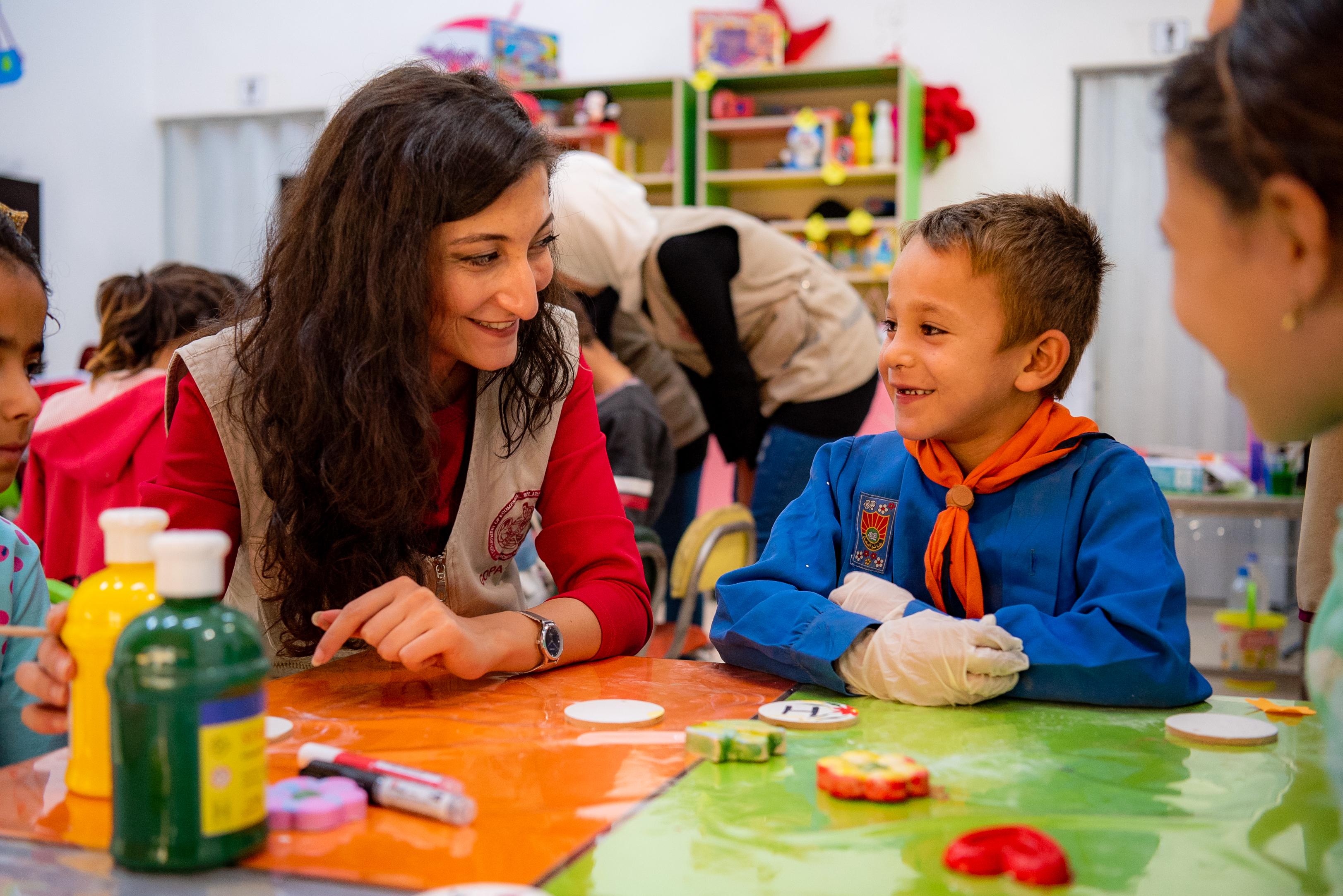
Peru. UNHCR distributes blankets and winter kits to vulnerable Venezuelans.
© UNHCR/Andrea Diaz
The project in brief
Implemented by
- Department of Immigration, National Superintendence of Migration, Peru
- Ministry of Health, Peru (Responsible for the Integrated Healthcare System - SIS)
- UNHCR
Country
Peru
Duration
Project started in 2019.
The initiative will continue to be implemented and expanded in other regions of Peru in 2020, especially for people with conditions of heightened vulnerability among UNHCR's Persons of Concern (PoCs).
Description
The initiative has allowed persons of concern with heightened vulnerabilities to access health care services through the national health system. Free health care through the state Public Healthcare System (SIS) is currently only available to specific groups of people of concern including children under five and pregnant women but was not previously available to persons of concern based on a wider vulnerability criteria until UNHCR, through advocacy and technical support, achieved that the Carné de Extranjería was extended to people of concern with wider vulnerabilities, through the Special Immigration Status, providing them the possibility to access the SIS. In 2019, some 4,000 persons, (14 per cent children) have been able to access this Carné de Extranjería (Special Immigration Card). This number is significantly more than the previous year and is growing rapidly as UNHCR continues to coordinate to refer and support extreme vulnerable cases. 65 per cent of the Special Immigration Carne de Extranjería cards have been provided to persons with serious diseases enabling them to access life-saving treatment.
The vulnerability conditions considered for the Carne de Extranjería are serious diseases, extreme poverty, elderly persons, survivors of sexual and gender- based violence (SGBV), pregnant women, victims of human trafficking, persons with disability, persons living with HIV, among others. The Carné de Extranjería allows the holder a migration status to stay legally in the country and access a range of rights including education, work, and health, among others.
Project aims
To provide safe and free access to national health care systems and legal stay for person of concern with heightened vulnerability.
Resources used
- Financial: UNHCR has provided funding to protection and health specialised partners to provide case management services to ensure access to the “Carné de Extranjería” and to provide orientation and information on the system to improve access more broadly and on an ongoing basis.
- Technical: Capacity development of the stakeholders engaged on health needs, legal documentation and international protection topics.
- Policy change: Through UNHCR’s coordination, the Superintendence of Migration now officially accepts medical reports from UNHCR health partners to provide the Carné de Extranjería to vulnerable persons.
- Furthermore, significant advocacy efforts have prompted the issuance of the Legislative Decree No. 1466 grating full access to testing and treatment for COVID-19 related health needs for persons of concern.
Partners
- Department of Immigration, National Superintendence of Migration
- ENCUENTROS: UNHCR partner, specialist in integrated protection services for persons of concern
- PROSA: specialist in integrated care for persons living with HIV and persons at risk
Challenges and how they were overcome
Challenges
- Recognition by the Ministry of Health of medical reports and documentation originating from other countries’ health care providers.
- Classification of poverty or extreme poverty is the most important criteria to access the free public healthcare system. According to state evaluation methods and criteria, some vulnerable persons of concern did not meet the criteria.
How they were overcome
- UNHCR coordinated with the Ministry of Health, the Superintendence of Migration to achieve the recognition of UNHCR health partners’ (PROSA and IFRC) medical reports.
- UNHCR worked with partners to ensure that the criteria should be clearly communicated and persons of concern with heightened vulnerabilities, including through communicating with communities, case management and orientation, could be supported through government, humanitarian and UNHCR assistance programs.
Results of the Good Practice
UNHCR persons of concern living with heightened conditions of vulnerability, who also lack documentation to access essential state support and services may be granted the “Carné de Extranjería” which gives them access to:
- Legal stay in Peru
- Integrated Services to a range of essential services, including health services related to HIV testing and treatment, contraception, psychosocial support and mental health services
- The Public Healthcare System, widening access to a range of health care otherwise only accessible to specific groups of asylum-seekers or PTP (Temporary Resident Permit (SIS for its Spanish acronym) holders, such as children under five and pregnant women
How the project meets the GCR Objectives
This modality of the “Carné de Extranjería” comprises two of the objectives of the Global Compact for Refugees that could be replicated in other countries, the objectives are as follows:
Objective 1: Ease the pressures on host countries
The free and safe access to national health services for UNHCR persons of concern is essential in reducing risks for vulnerable individuals and public health risks broadly
Objective 2: Enhance refugee self-reliance
Integration into the national health system, education and work/livelihoods options due to their legal status for vulnerable person of concern, reduces dependency on humanitarian assistance, helps persons of concern to connect with more durable solutions in terms of local integration and can help in improving person of concern’s knowledge and access to a broader range of services.
It is worthy to mention that due to the COVID-19 pandemic and as a result of UNCHR’s strong advocacy work with the Peruvian authorities for the inclusion of refugees and migrants who are diagnosed or suspected of having COVID-19 into the public healthcare system, as of April 2020, the government issued a Legislative Decree (No. 1466), which temporarily includes asylum-seekers, refugees and migrants into the subsidized health system for COVID-19 care, until the patient is cleared.
Next steps
- UNHCR intends to coordinate further with the Ministry of Health to advocate that all cases holding Temporary Stay Permit (PTP as acronym in Spanish) are entitled to access the SIS public healthcare system. Health has been identified as the second priority need by persons of concern, in different UNHCR protection monitoring and participatory assessment exercises.
- UNHCR will provide financial support to incorporate two new staff to the Superintendence of Migration in their vulnerability Office to improve their capacity to support vulnerable persons of concern.

